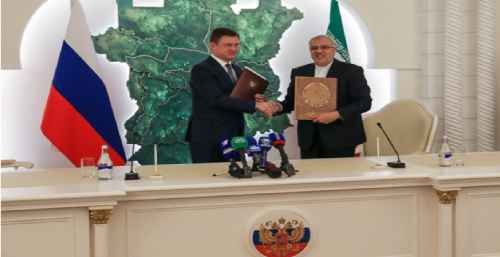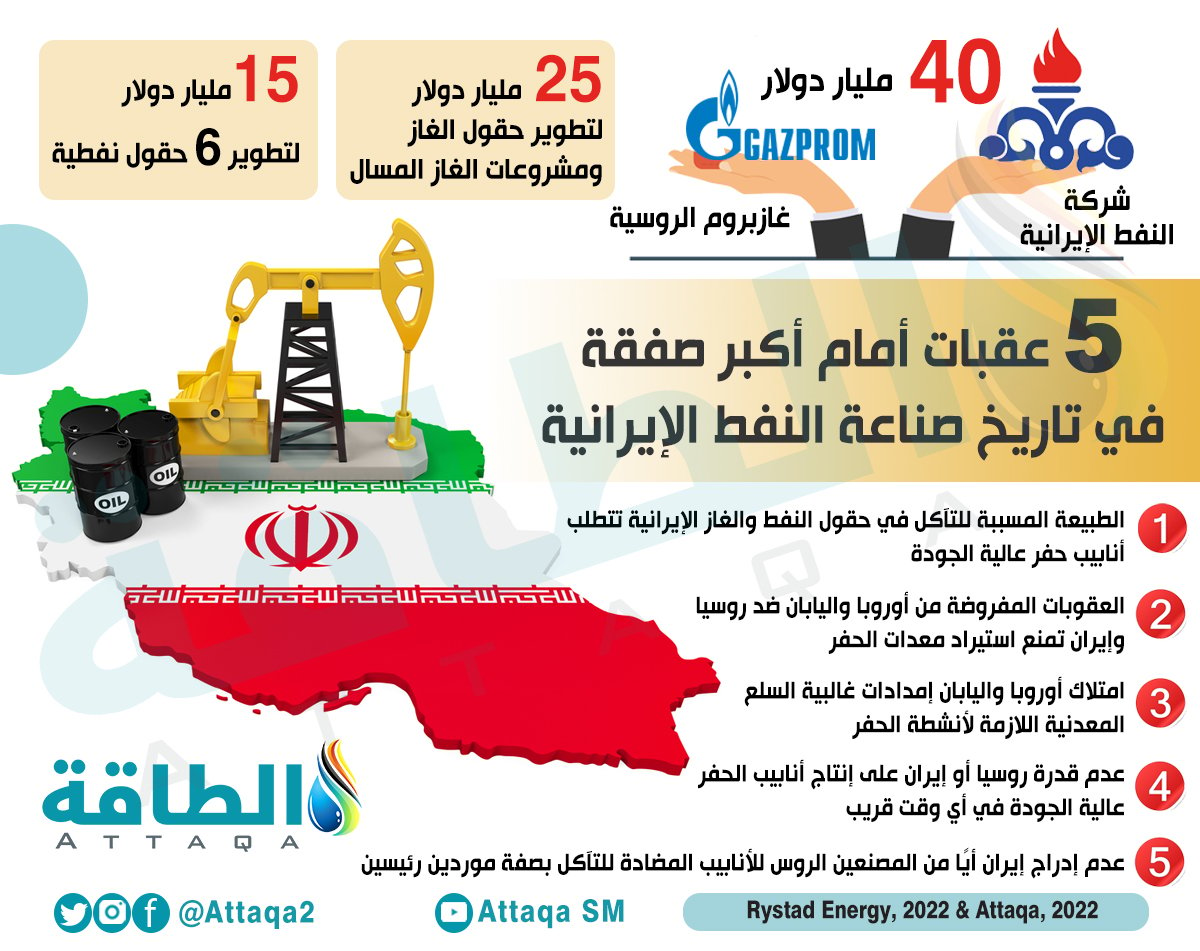Read in this article
- These agreements are expected to enhance Iran’s energy infrastructure and production capabilities
- Persistent technological limitations and hurdles make it difficult to implement these ambitions
- Memorandums of understanding between Iran and Russia provide a platform for improved cooperation in oil exploration and production
- It is believed that the partnership between Russia and Iran is circumstantial and depends on the compatibility of Iran and the West
- Russia has demonstrated flexibility and adaptability by exploring alternative markets and partnerships
Tehran is counting on the largest deal in the history of the Iranian oil industry, which it signed during the past year (2022) with Russia, to support its hydrocarbon exports, in a way that supports its national economy, which is suffering under the weight of US sanctions.
The changing geopolitical mechanisms and complex interdependencies contribute to shaping the features of the energy sector, and memorandums of understanding represent the basis for future partnerships, enabling countries to explore potentials, identify common interests, and establish frameworks for cooperation in the field of energy.
In July 2022, the National Iranian Oil Company and Russia’s Gazprom signed a memorandum of understanding worth $40 billion, which media described as the largest deal in the history of Iran’s oil industry.
The memorandum identified various areas of cooperation, such as the development of oil and gas fields, the exchange of gas and products, liquefied natural gas projects, the establishment of gas export pipelines, and scientific and technological cooperation.
The agreements of the largest deal in the history of the Iranian oil industry are expected to enhance Iran’s energy infrastructure and production capabilities while providing an opportunity for Russia to expand its position and influence in the Iranian energy market, thus strengthening bilateral relations between the two countries.
It is believed that the possibility of the emergence of a union of global gas producers because of this partnership has raised concerns, however, the continuing limitations and technological obstacles make it difficult to implement these ambitions.
Memorandums of Understanding between Iran and Russia
The MoUs between Iran and Russia provide many potential advantages and opportunities, and represent a platform for improving cooperation in oil exploration and production, enabling both countries to benefit from their resources and expertise.
Facilitated technology transfer will give Iran access to cutting-edge Russian technologies and know-how in the oil industry. In addition, MoUs enhance the potential for joint ventures and investments, allowing both countries to diversify their energy portfolios and attract outside capital.

Nevertheless, the implementation of memorandums of understanding between Iran and Russia and the terms of the largest deal in the history of the Iranian oil industry is affected by the ongoing conflict in Ukraine, and the escalation of geopolitical tensions due to the conflict, which has drawn attention to Russian energy operations.
Western countries, especially the United States and the European Union, have imposed sanctions on Russia, which may affect the implementation of memorandums of understanding, as the sanctions can impede access to technology, financing and international cooperation, which may hinder the development and effectiveness of agreements, which threatens the failure of the largest deal in the world. History of the Iranian Oil Industry.
Despite their historical animosity, Russia and Iran have come to understand each other, as they deal with Western concerns.
Years of isolation and Western preferences for other suppliers have hampered Iran’s attempts to export gas to Europe, making Russia a desirable partner.
On the other hand, the types of microtubes needed for large gas projects are restricted by sanctions and cannot be imported, and in light of technological limitations and lack of experience, both countries are struggling to build LNG facilities.
Russian participation in the Iranian energy sector
It is important to conduct a critical analysis of the intentions and historical context of Russian participation in the Iranian energy sector, as well as its objectives as a result of signing the largest deal in the history of the Iranian oil industry, whose investments amount to about $40 billion.
Questions have been raised about the timing of these memorandums of understanding and the absence of similar agreements when Russian oil and gas companies were not subject to sanctions.
The withdrawal of some contracts – such as the participation of the Russian Zarubij Oil Company in the development of the Jangola field, due to allegations that Iran is subject to sanctions – raises doubts about the consistency of Russian intentions and the reliability of its commitments.
From a technical perspective, Russia relies on international licensees for expertise in booster platforms and building LNG units.
This raises questions about its ability to transfer technology and provide significant assistance in these areas. In addition, the significant financial challenge of about $80 billion for gas compression boosting platforms required throughout the development of the South Pars field exacerbates the complexity.
The visit of Russian Deputy Prime Minister Alexander Novak to Tehran emphasized the importance of joint infrastructure projects in transportation and energy, which are under the personal control of the leaders of Russia and Iran.
For his part, Iranian Oil Minister Javad Oji spoke about the ongoing meetings within the framework of a joint committee to set oil prices, and expressed his confidence in reaching an agreement on crude prices in the region.
Despite the common challenges posed by sanctions, both Iran and Russia believe they can overcome them through mutual support.
While the $40 billion MOUs in the largest deal in the history of Iran’s oil industry hold potential benefits for Moscow and Tehran in terms of energy cooperation and economic relations, it is necessary to address the challenges and uncertainties to take full advantage of the opportunities they present.
Dealing with geopolitical complexities, overcoming sanctions, and securing the necessary financial resources and technical expertise are among the critical considerations.
Impact of sanctions on the Russian energy sector
The sanctions greatly affected the Russian energy sector, which was reflected in its operations, investments and technological developments. The sanctions of Western countries – due to geopolitical tensions and concerns about Russia’s actions in Ukraine and other international affairs – targeted the energy industry.
An important effect of the sanctions on the Russian energy sector is to restrict access to Western technologies and equipment.
It is worth noting that Western companies often develop the advanced technologies needed for exploration, production and refining.
These sanctions limited Russia’s ability to obtain these technologies, which slowed technological progress and is likely to affect the efficiency and productivity of its energy projects.
In addition, the sanctions targeted Russia’s access to international capital markets, making it more difficult for Russian energy companies to secure financing for their operations and investment projects.
Restrictions on debt financing and equity investments have limited the availability of funds for exploration, development and infrastructure projects.
This affected the pace of new developments and the overall growth potential of the Russian energy sector, and the sanctions had an impact on international partnerships and cooperation in the energy sector.
For their part, Western companies have been wary about entering into new joint ventures or partnerships with their Russian counterparts, due to concerns about potential legal and reputational risks associated with sanctions. This has limited opportunities for technology transfer, knowledge sharing, and foreign investment in Russian energy projects.
Finding alternative markets
In response to the challenges, Russia has sought alternative markets and partners, particularly in Asia, to mitigate the impact of Western constraints.
Russia’s energy exports and investment strategies have been redirected, with a stronger focus on cooperation with countries such as China and India.
Although this diversification has provided some relief, it has not fully compensated for the loss of Western partnerships and markets.
The following infographic prepared by the energy platform presents 5 challenges facing the largest deal in the history of the Iranian oil industry:

The nature of the partnership between Russia and Iran
It is believed that the partnership between Russia and Iran is circumstantial, and depends on the compatibility of Tehran and the West. Given the economic difficulties faced by both countries and the lack of guarantees, it is questionable whether the projects included in the largest deal in the history of the Iranian oil industry will be feasible and profitable.
The continuation of EU sanctions against Russia and Iran makes the prospects for success for the global gas producers union bleak. These observations shed light on the complex interactions between Russia, Iran, and the West in the energy sector.
It is necessary to study the difficulties and uncertainties behind their cooperation in the field of energy, in order to fully understand the geopolitical and economic repercussions of these developments, as the sanctions posed great challenges to the Russian energy sector, affecting its growth potential, technological progress and market opportunities.
However, Russia has demonstrated flexibility and adaptability by exploring alternative markets and partnerships, and although memorandums of understanding between Iran and Russia in the energy sector provide opportunities for enhanced cooperation and diversification, they must be approached from a critical perspective.
An assessment of the historical context, technical constraints, and strategic interests of the parties involved is critical to ensuring the feasibility and practicality of the proposed cooperation in Iran’s energy sector.
* Dr. Umud Shoukry, senior advisor on foreign policy and energy geopolitics, is the author of U.S. Energy Diplomacy in the Caspian Basin: Changing Trends Since 2001“.
*This article represents the opinion of the author, and does not necessarily reflect the opinion of the energy platform.
Also read..

Leave a Reply